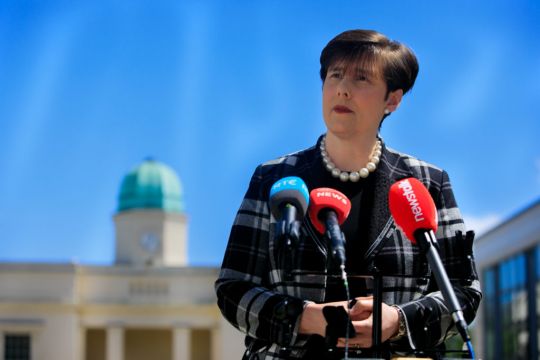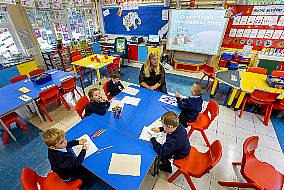Updated at 13:29
The Minister for Education has refuted claims that a “blind-eye” is being turned on Covid-19 transmission in schools.
As the Irish Examiner reports, Norma Foley appeared in the Dáíl this Thursday morning, facing questions from opposition TDs as part of priority questions.
Her appearance follows the announcement on Wednesday afternoon that significant changes to the contact tracing protocol for schools are to come into effect from Monday.
From September 27th, primary school students will no longer have to self-isolate if they don’t have symptoms after being identified as a close contact of a positive case in schools.
On Thursday in the Dáil, Paul Murphy, People Before Profit/Solidarity TD, said the change of testing policy “does not make sense.”
“If you have a situation where a child goes to a birthday party for half an hour, they are counted as a close contact and have to be tested.”
Protection measures
“Alternatively, if they're in school for a week in the same pod as another child all day, every day for a week, now all of a sudden they don't count as a close contact.”
Minister Foley refuted his claims, saying that there was “absolutely no question of turning a blind eye to anything in our schools."
“I want to be very clear that all the protection measures recommended by public health are currently in our schools, and remain in our schools, despite what might be happening in wider society.”
It comes as the principal of a national school in Westmeath has described the changes in contact tracing for school children as “slightly illogical” and said that a more cautious approach should have been taken.
Matt Melvin of St Etchen's National School in Kinnegad, Co Westmeath told RTÉ radio’s Morning Ireland that, in his experience, “there have never been more cases in schools than there are now” and that he believed the same situation applied in other schools across the country.
Mr Melvin called for an explanation as to why a child with a head cold could be sent home from school, while a close contact could remain in the classroom. In his school at present there was a class and two pods operating out of the classroom which were working quite well, he said.
Shocked providers
The principal said parents were happy that the children attending school were “healthy, happy and educated”. Mr Melvin added that his school also operated a pre-school for students with autism spectrum disorder (ASD) for whom Covid restrictions had not changed.
Also, on the same programme, Elaine Dunne, Chair of the Federation of Early Childcare providers said a lot of cases were being seen and there were “a lot of panicked providers”. The abruptness of the decision had shocked providers who look after children with underlying conditions with whom they have to be cautious, she said.
“Everything has gone and nothing has been explained.”
Ms Dunne issued an invitation to healthcare professionals to see how crèches operate and the policies and procedures that had been put in place to keep people safe.
Later Dr Abigail Collins, the HSE’s clinical lead on child health told Morning Ireland that from the public health perspective it was important that responses were evaluated and proportionate.
“The balance of the benefits and the harms of excluding well children, not children with symptoms who we would be concerned about, from society and not just from school, is something that needs to be addressed and considered.”
Schools remained a low risk setting, she said.
Medically vulnerable
“We know that within the household setting the risk of transmission has always been the highest there, so it's appropriate that we keep those children out of school and have that precautionary approach.”
Dr Collins acknowledged that children with special needs were medically vulnerable, so a risk assessment would be required in their cases as there was a different level of contact between them and their carers and SNAs.
“For the vast majority of children, it's appropriate that we consider whether the thousand plus children who are completely well, who are being excluded from society, is a price that we should reasonably be asking them to pay.”
Dr Collins said it was up to parents to gauge if their child was well enough to go to school, if they had a runny nose and no other symptoms, then they should go to school. Parents would know if their child was “off form” and should keep them home from school and speak to their GP.
Personally she thought that the country was now on the pathway to endemic rather than pandemic, the vaccination programme had made the difference.
Defended
The HSE’s National Lead for Testing and Tracing Niamh O'Beirne also defended the changes to close contact rules, saying that they were based on evidence.
“When we look at the risk assessment we have to look at the impact on children and how important it is they are in school and continue their education because it has been disturbed over the last two years,” she told RTÉ radio’s Today with Claire Byrne show.
Ms O'Beirne said that the positivity rate among children at present stands at five per cent, compared to a level of 14.5 per cent reported before children returned to school. There had been a dramatic increase in testing in the last seven days – 180,000, she said.
Later on the same programme, Minister for Children Roderic O'Gorman said that his department will issue guidance to the childcare sector on new close contact tracing protocols by Friday morning.
The changes were a recognition that the public health situation in Ireland was improving, he said.







